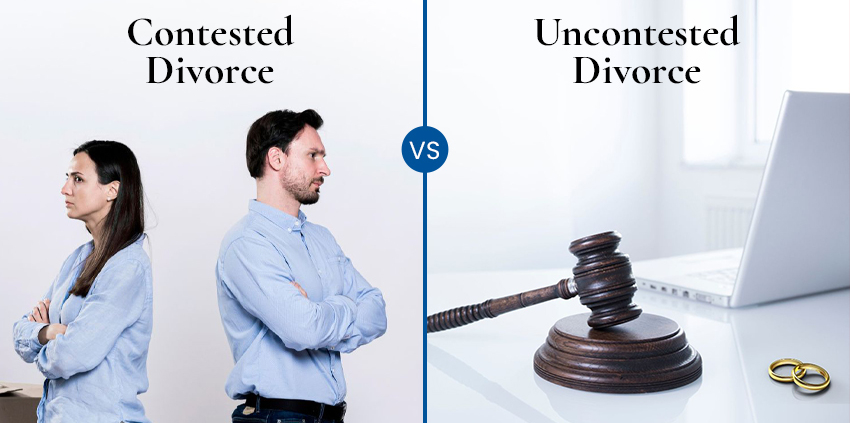Contested Vs Uncontested Divorce – Which One Is Better?
Ending a marriage is an unimaginably significant emotional challenge. However, deciding how the marriage should be ended is a far bigger enigma. Spouses are often stuck between the choice of keeping their problems confidential or attaining justice through legal procedures. This dilemma is common across the globe, and Canada is no exception.
In order to make the choice easier for couples, the Canadian government has put forth two different types of divorce processes;
- Contested divorce
- Uncontested divorce
Unfortunately, many tend to mix up the legal jargon and confuse these divorce types with fault and no-fault divorce. The latter is not a surprise owing to the increased content-sharing accessibility over the internet and the lack of any means of withholding or eliminating false content.
As Edmonton’s most reputed family lawyers, we understand that false content can further aggravate the situation and make the process highly overwhelming to families. For this reason, we suggest that couples limit their research on such technical issues to only experienced family lawyers and not trust any random blog post they come across.
For those who understand the basic concepts, the decision between pursuing a contested or uncontested divorce can be confusing. In this regard, the most frequently asked question we address is, “which of the two is better?”
Although we often recommend ADRs such as divorce mediation to our clients as a good ideal option, contested divorces may occasionally be unavoidable.
So in today’s blog post, we shall discuss the definition and suitability of contested and uncontested divorce and also suggest the better option among the two. As a starting point, let us eliminate the confusion between divorce types and grounds.
Divorce Types VS Grounds
As pointed out earlier, countless families have mistakenly perceived fault divorce as one of the divorce types or even say that a contested divorce is the same as a fault divorce. In Canada, we only have contested and uncontested divorces. There is no other type of divorce.
So what are fault and no-fault divorces?
Well, in order to get a divorce in Canada, you must demonstrate that you were legally married and the marriage has broken down for some reason. These reasons are known as divorce grounds in legal terms. Now, the nature of your divorce grounds will categorize them into either fault or no-fault divorce.
For instance, if you file for a divorce with a one-year separation as a ground for a marriage breakdown, the divorce ground is no-fault. But if the reason behind the divorce is domestic violence or adultery, it will be called a fault divorce.
All in all, fault and no-fault are divorce grounds, not types.
What Is A Contested Divorce?
Divorce types actually refer to how you and your spouse have chosen to resolve your issues. When you have both decided to end the marriage, the biggest question is how you will divide your properties and who will get child decision-making rights.
If you and your spouse can not reach a consensus on issues like spousal support, child support, and assets and liability divisions, the court will settle these matters through public trial for you. The divorce becomes contested when one party files for the divorce and lays forth their position on the above-mentioned issues, and the second party responds to the application by disagreeing with some or all of the matters.
To resolve the matter, the court hears out the arguments of each party and provides a divorce order accordingly.
What Is An Uncontested Divorce?
If both parties agree on the arrangements regarding property division, child support, etc, and the respondent does not dispute the application submitted by one party, the divorce is uncontested. The only thing left is for the court to review the terms of the agreement and process the divorce.
Which One Is Better?
Clearly, an uncontested divorce is faster, less complicated, and inexpensive. Not only do you save on all the legal costs of litigation, but you also keep your family issues confidential. However, if your spouse has a domineering personality or tries to get an unfair advantage, going for an uncontested divorce may be more suitable.
Nonetheless, the process will be quite lengthy, and you might have to wait for years before obtaining a divorce decree.
Do You Need A Family Lawyer For An Uncontested Divorce?
For a contested divorce, legal representation is absolutely necessary to challenge the technical arguments presented by your counterpart’s family lawyer. While many people believe that hiring a family lawyer is not necessary for an uncontested divorce, we suggest that you at least consult one to ensure you understand your rights and are not being kept in the dark by the other party.
Read Also: The Need For Reputable Family Lawyers When Filing For A Divorce
In fact, you should at least ask a reputed family lawyer to oversee your divorce documents to avoid mistakes.
The Role Of Divorce Mediation Services
Mediation services are the best way to resolve your disagreements without having to drag them into a public trial. Although a mediator is not a judge and does not make a decision for you, they do streamline the process by suggesting the most suitable solutions to the disputed matters. Since a mediator is impartial, you don’t have to worry about being kept in the dark as the mediator will ensure your rights are not overridden.
So even if you do not agree on certain things with your spouse, we recommend you try divorce mediation before filing for a contested divorce.
About The Divorce Company
We help couples avoid the pain of a contested divorce by offering high-end mediation services to help couples reach viable and mutually beneficial agreements. Learn more about The Divorce Company.
Need mediation services? Contact us now.



